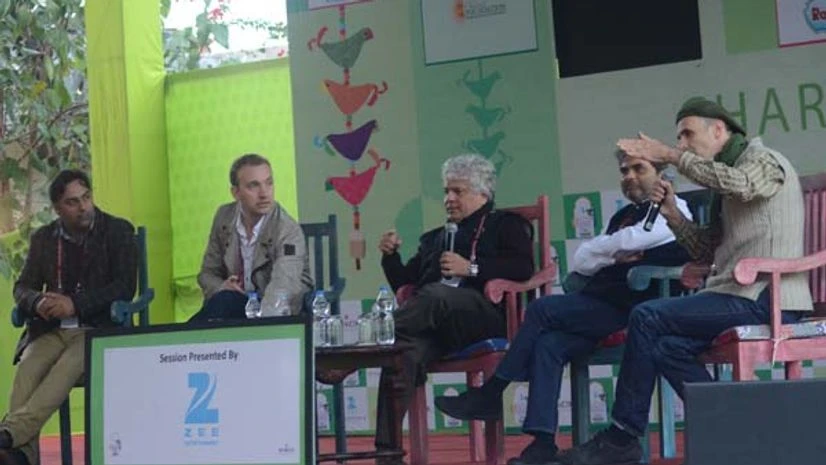Whoever braved the downpour that Jaipur witnessed this morning to go to the ZEE Jaipur Literature Festival on Day Two were in luck to see Vijay Seshadri talk. The Pulitzer-winning American-Indian poet was a fascinating speaker who left the audience crave to hear more from him. Due to the incessant rains, all the sessions were moved indoors and that led to a curtailment of the hour-long sessions into mere 30-minute gabfests. Seshadri spoke at length about the emigrant experience during one such curtailed talk with Sadaf Saaz Siddiqi.
He quoted W H Auden famous quote on the subject, "Emigrants don't know what they want but they do know what they don't want." His witticisms about American experience for a non-white person and Pulitzer Prize left the packed auditorium in splits. "The Pulitzer Prize is a nice thing. I recommend it to everyone," he said with his deadpan disposition intact.
Another session that was deeply interesting was on Pakistan. Journalist Suhasini Haider moderated the session titled "Descent Into Chaos— Pakistan on the Brink" with Ahmed Rashid, ex-Pakistan foreign minister Khurshid Mahmud Kasuri, G Parthasarathy and Anatol Lieven. The experts plunged deep into the topic and came up with fascinating insights. Rashid said that India and Pakistan need to mend their ties. "If Putin can talk to Obama, why not India and Pakistan," he asked. The growing msucle of Pakistani Taliban was much pondered upon. All panelists concurred that the new Afghanistan government should indulge Pakistan more. Parthasarathy went a step ahead and said that the Manmohan Singh-government ignored the 2008 attack on the Indian embassy in Kabul, a costly mistake that led to the 26/11 attacks.
In terms of intellect, the session titled "Double Lives: Writers as Critics" gets brownie points. Alberto Manguel, Amit Chaudhuri, Will Self, Nicholson Baker spoke to Chandrahas Choudhury about writers moonlighting as literary critics as well. Names of critics like V S Pritchard, Roland Barthes, George Sainsbury were thrown around in the most articulate manner. Self was candid enough to admit that in his "heart of hearts" he's essentially a writer. Chaudhuri said that his formative childhood was spent by reading essays by Orwell and Camus.
The session that attracted most people was the one called "Coming Out: Tales They Don't Tell". Mark Gevisser, Sarah Waters, Devdutt Pattanaik, Damon Galgut and Christos Tsoilkas. The talk moderated by Sandip Roy delved on the subject of writing about homosexuality and how a writer comes to terms with it himself. Gevisser said that if a white person comes out in the open to his liberal parents, they are most likely to say, "That's wonderful, it's what we worked for." Roy said in jest that in West "coming out of the closet" signifies doing something radically different from the family structure while in India the same phrase means that the whole family enters the closet. Waters said that when she declared herself a lesbian in the 90s it was unheard of, while now it's almost normal.
A group of Australians who made their first trip to India from Melbourne were ecstatic about their experience. 32-year-old Sarah Lawrence said that, "I find this far more interesting than the Australian Open that's happening in my town." And that's the most heartwarming tale of the day: the fact that people waded through the muddy waters to listen to their favourite writers. The festival organisers hope to attract at least 220,000 visitors this year and, come rain or hail, they will be reaching that number
Day Two of JLF ended with Jhumpa Lahiri winning the princely sum of $50,000 as part of the DSC Prize for South Asian Literature for her novel The Lowland, which was set in the sixties' Kolkata and explores brotherly bonds in the wake of political upheavals.

)
